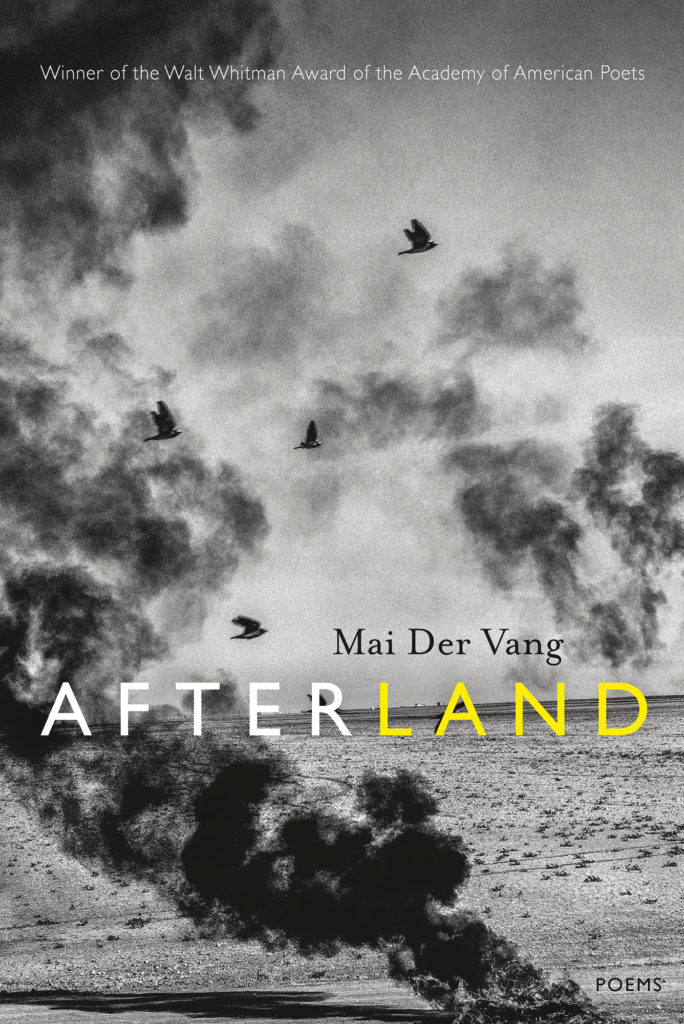
As a poetry collection, Afterland demonstrates not only Mai Der Vang’s masterful use of imagery, but also a deep understanding of lyrical rhythms. Stylistically, Vang is similar yet distinct from other Southeast Asian American poets, demonstrating a shared stylistic preference for shorter pieces but capturing moments in the present tense. Unlike other Southeast Asian poets – particularly Vietnamese American poets such as Hieu Minh Nguyen and Bao Phi – Vang often more elaborately conveys wartime moments in the present instead of as memories. Vang does more than recall the past, she revives it, as she does in “Final Dispatch from Laos”:
Concerning our unused stomachs,
Molars waiting to chew, taste buds
Obsolete. By then, we won’t remember
We’re alive. We’ll be the soil covered
In mines.
With such sharp description of these moments in present tense, Vang summons the past vividly and gruesomely, tugging and shoving the reader through Afterland in relaying the cruelty the Hmong suffered during the Secret War in Laos. The intensity of the pieces in Afterland, at times, is uncomfortable, as in “Dear Soldier of the Secret War,” where Vang writes:
Do you think of your missing wife
how the Pathet Lao dragged her
naked, screaming, and bleeding
by her long black hair
deep into forest shadows
This wild hazard is the very real backdrop to the past Vang recounts. It is not a haunting which hovers over the shoulder but seizes one into its entirety.
Yet, even among the consistent anxiety and horror, there are moments of softness punctuating the uneasiness. The softness, too, is deeply painful, but it is nonetheless tender, as it is in “Light from a Burning Citadel: “Once this highland was our birthplace. Once / we were children of kings.”

Vang’s skill and artistry is well-established throughout Afterland. What, perhaps, might be equally as noteworthy is the content Vang brings into the greater discussion among Southeast Asian American writers and communities. In a Southeast Asian American literature saturated mostly with Vietnamese American writers, the written relationship between American involvement in Southeast Asia and Southeast Asian Americans is typically one permeated with themes of regret and debt. Vang’s Afterland details a different kind of relationship, one of abandonment and neglect.
In the middle of a wider conversation among Southeast Asian Americans about the struggles of coming to the United States as refugees and as children of refugees, Mai Der Vang interrogates what it really means to be a refugee in Afterland. While most Vietnamese refugees in the United States have not and often do not return to Vietnam, when they do discuss Vietnam, the phrase used to describe visiting is về, as in to return. When Vang discusses the concept of exodus in “Dear Exile,” she writes:
When my parents left
You knew it was for good
It’s a herd of horses never
To reclaim their steppes
The poetry collection is a confrontation of circumstances even Southeast Asian America – or at least its more visible components – has refrained from explicitly addressing, such as the Secret War in Laos or the myriad devastations American involvement in Southeast Asia caused. With Afterland, Vang contributes to the plurality and heterogeneity of voices conversing within the Southeast Asian American literary community, both contesting – in stylistic and subject choices – and complementing what other contemporary Southeast Asian American poets have discussed. While Khmer American writer Sokunthary Svay has engaged in the Khmer American literary community in New York City, Vang mentions the Hmong community in Central Valley through the image of Mount Whitney in “Your Mountain Lies Down with You”:“You will see Mount Whitney is as beautiful as Phou Bia.”
Through striking diction and intelligent verse, Afterland has earned its place as a distinct, prominent addition to the contemporary Southeast Asian American poetic canon, cultivating complexity in the definition of refugee and demonstrating the incongruities among not only Southeast Asian American literary voices, but Southeast Asian American experiences. Vang’s verse is precise, unafraid, and clear:
I’m moving on
To what the world needs me to know.
I am the angel trapped inside the bullet.
I am the exit wound trapped inside the angel
“Last Body”
*
CONTRIBUTOR BIO
Do Nguyen Mai – name written family name to given name – is a Vietnamese American poet, a Southern California native, and an ardent advocate for Vietnamese American progress. She is the founding executive editor of Rambutan Literary and her debut poetry collection, Ghosts Still Walking, is available from Platypus Press.


